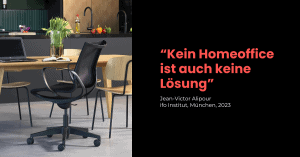Is the "right to a home office" coming?
What will actually happen on 19 March 2022, when the pandemic situation in Germany has eased? Until that date, companies should allow their employees to work from their home offices.
A "right to home office" would have to be regulated in a binding manner. So the ball is in the legislator's court. In January, Labour Minister Heil spoke out in favour of there being no right to home office. As of today, there is a "legal obligation to discuss". This stipulates that companies and employees discuss the possibilities and ideally reach an agreement.
There is therefore no right to a home office, but also no obligation in the sense of the employer's right to give instructions.
Living with the crutch "mobile working
Many companies now send their employees to the "mobile office". In doing so, they circumvent numerous occupational health and safety regulations that must be complied with in the case of so-called "full" or "alternating" teleworking.
With this "crutch", companies have found a format to mobilise their staff pragmatically and at short notice under corona conditions in the home office. "Mobile working" saves them considerable costs. Otherwise, ArbStättV, ArbSchG or ArbSchVO would have to be complied with, which would result in considerable costs for checking and complying with these regulations and laws. Not to mention expensive equipment such as ergonomic office chairs or height-adjustable desks.
What would a right to home office mean?
A right to home office would therefore have considerable financial consequences for companies. Due to the existing high tax and duty burden, as well as the current price increases in logistics and energy, an additional burden on companies is likely to be politically difficult to implement.
So the wait for the legislator may be long. Especially for a draft with clear regulations that fit a large number of companies. Valuable time is lost in waiting. Other companies use this time to further expand their competitive advantage.
The home office should stay - take Apple & Amazon as a model
A lack of legal foundations and framework conditions is one thing, but dealing with the issue is another. This is shown by the labour market, which has quickly adapted to the situation. According to Indeed / 2022, on average 10.9% of all job ads nationwide included the possibility of a home office. Flexibility attracts young talent, especially Generation Y and Z, which is highly sought after.
Working remotely for a company in Berlin during the day and skiing in the Alps in the evening. No contradiction. Here, too, the USA is a pioneer. In the first months of the pandemic, companies like Apple or Amazon from the expensive Silicon Valley recognised the opportunity. They have attracted talent from the southern states by offering home offices. The home office should stay! That's what the majority of employees in the United States want in 2022, according to a study by the WFH Research Project.

Be one of the Corona winners!
Of course, experts also see potential for conflict when it comes to the home office. The discussion on the part of companies is wide-ranging. It ranges from "back to the office" to "dissolution of office space". Yet the situation can be resolved objectively and factually. The whole process gains momentum and motivation when all stakeholders in the company are involved in the drafting of a decision. It is well known that interests are wide-ranging. However, the range of wishes and ideas of the parties are not a contradiction to productive and efficient work. Rather, freedom should be granted where it is organisationally and economically feasible.
Motivation for all involved
The wishes expressed can be objectified and supported with facts and figures. In the end, it is a matter of finding a line and putting it into a decision document. This is more than just a way of thinking, it is a corporate cultural freestyle that is generally well received by all those involved. Because a joint decision is also easier to comply with for all involved.
At XOROS Home, we take a holistic view of hybrid working. Of course it is helpful, ergonomic chairs and Height adjustable tables offered by their company for their own home office. It is a clear benefit if the employee can choose the furnishings individually. Then the living room also remains visually a place of well-being. In addition, employees often lack physical and psychological support. This can lead to significant absenteeism. It is even more serious when the motivation of the employees suffers.
Book a free consultation at xoros-home.com/terminal/! We look forward to informing you about further solutions for productive and healthy working in the home office.
Photo by Markus Winkler on Unsplash






